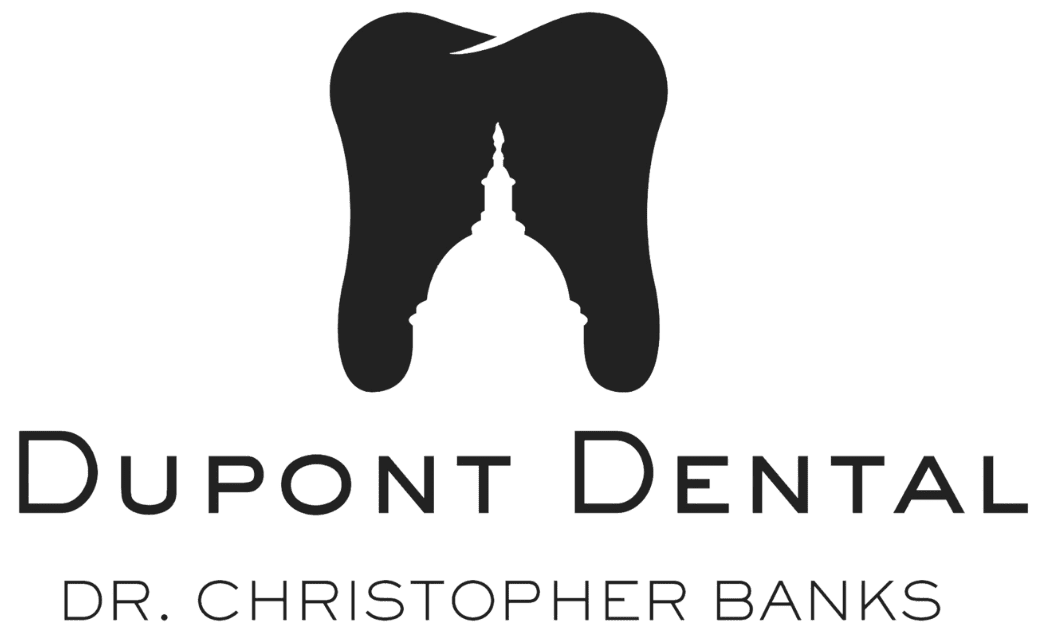Are you missing most of your permanent teeth? Restore your smile with dentures. Dentures are dental restorations that can replace rows or arches of missing teeth. Dr. Christopher Banks works with oral surgeons and local laboratories to provide dentures and partials to patients in Washington, DC.
High-quality materials and proven treatment methods make modern dentures a natural choice. Dentures can restore the look and function of your teeth. Our office can also secure your denture with dental implants for the best results. We ensure your final restoration looks and feels natural whether you need full or partial dentures.

Types of Dentures and Partials in Washington, DC
Knowing the different types of dentures can make it simpler for our patients to understand which treatment option suits their needs and goals. Partial dentures can renew rows or missing teeth in different areas of the mouth, while complete dentures replace the upper or lower arches of teeth.
Removable Partial Dentures
A removable partial denture is the most common kind of partial denture. It comprises a combination of replacement teeth on a rigid cast metal frame. Metal clasps attach the partial dentures to the existing teeth. This denture offers easy removal for cleaning while restoring both aesthetics and chewing ability.
Flexible Partial Dentures
These partial dentures are made of a plastic that is heat-sensitive and thin. This can make them more comfortable to wear and create a more natural look.
Instead of cast metal clasps, a flexible partial denture has thin gum-colored clasps that fit around your teeth’s natural places. It might be a good solution if you find other types of partial dentures uncomfortable.
Removable Dentures
Traditional dentures are great options for patients with missing teeth. These dentures consist of false teeth on a gum-colored base. While removable dentures restore the smile’s appearance, they can slip because they lay on the gums and use adhesive to stay in place.
Patients with removable dentures can also have restrictions against hard or crunchy foods. They do not restore the bite’s full function.
Fixed Dentures Supported with Dental Implants
Implants are titanium posts that an oral surgeon places in the jaw bone. Once the implants fuse with the jaw bone, they offer a stable foundation for restorations like dentures. Dental implants encourage jaw bone growth and support the fixed denture.
A fixed denture supported by dental implants is also an excellent option for people who previously had a removable denture but want more support. Implant-supported dentures are easy to care for and permanently stay in the mouth.
What Are the Benefits of Implant Dentures?
Unlike removable dentures, implant-supported dentures stay in the mouth. They also help support the surrounding bone and gum tissues. For this reason, implant-supported dentures offer many benefits:
- Easier Biting and Chewing: Because removable dentures lie on the gums, they can make it hard to eat hard or crunchy foods. When you get traditional dentures, you may be restricted to eating softer foods. Implant dentures restore most of your natural bite function, so you can eat what you love with fewer restrictions.
- Prevent Facial Sagging: When you lose a tooth, you also begin to lose your natural jaw bone. Without support from the teeth, your lower face can begin to sag. If you get implants, we will graft healthy bone to support the implants. The implant posts will continue to support this bone and maintain your face shape.
- Natural-Looking Results: We work with a dental lab to create custom dentures. Based on our measurements and dental impressions, lab technicians will create your denture from tooth-colored materials. If you have remaining teeth, your denture will blend in with the natural tooth shade.
Dr. Banks will work with you to see if you’re a good candidate for implant dentures. He’ll conduct a thorough exam before treatment.
Getting Dentures in Washington, DC
Before we place dentures, Dr. Banks takes X-rays to get a clear view of your teeth, gums, and jaw. This helps him determine if you need pretreatments before you get your new teeth. You must be in good oral health before treatment to ensure your false teeth stay stable. Dr. Banks can provide fillings, root canal therapy, tooth extractions, and gum disease treatment as needed.
If you get implants, you must have enough healthy jaw bone to support the implant posts. Dr. Banks can recommend bone grafting to build up healthy tissue and prepare for implant treatment. You can expect a different treatment process when you get traditional dentures and implant dentures.
Traditional Dentures
Dr. Banks will take dental impressions to begin traditional denture treatment. He sends these impressions and other specifications to a local dental lab. The lab technicians will make your custom denture according to your tooth shade, mouth measurements, and impressions.
Dr. Banks will provide you with temporary dentures so you aren’t without teeth as you wait. Once the final dentures are complete, you’ll return for a denture fitting.
Implant Dentures
If you get implant dentures, a surgeon will first place the implants in the jaw bone. You will need 3 to 6 months for the jaw bone to grow around the implant posts. This process is called osseointegration. Then, we will attach the abutments or connector pieces. These pieces connect the implants to the dentures.
You’ll need more time for your gums to heal. Finally, we place the final dentures. We’ll make adjustments as needed, so your new teeth feel comfortable.
While implants lengthen the treatment process, they ensure your dentures last longer. Because the implant posts use high-quality titanium, they will last forever.
Patient Review
Frequently Asked Questions
Do you want to know more? Our office can help. Read answers to common questions about dentures in our Washington, DC, dental office.
How long does the entire process take for getting implant-supported dentures?
Getting implant-supported dentures usually takes about 4 to 8 months from start to finish. First, we place implants in your jawbone, and then we allow a few months for them to heal and integrate fully.
After that, we’ll fit your customized dentures securely onto the implants. The exact timeline can vary depending on your bone quality and overall oral health. We’ll clearly outline each stage so you always know what to expect.
How do I clean removable and implant dentures?
If you have removable dentures, you must remove them for cleaning. First, rinse them under running water to remove any loose food particles. Then, use a soft-bristled toothbrush and a mild denture cleaner to clean your denture. Remember to brush your gums and tongue to keep your mouth healthy.
We recommend that you remove traditional dentures at night. Wearing dentures at night can lead to sore gum tissue. At night, soak them in a denture-cleaning solution to prevent them from cracking or drying out.
If you have implant-supported dentures, your dentures are non-removable. You can brush and floss them like natural teeth.
But pay special attention to cleaning around the implant abutments and attachments. Use a smaller, softer brush or an interdental brush to clean these areas thoroughly. Some patients benefit from cleaning dentures with water flossers.
Our office will provide instructions on how to clean your dentures, but we welcome you to ask questions. We can provide tips to keep your mouth and dentures clean every day.
Can I sleep with my dentures or remove them at night?
You should remove your dentures before sleeping. Leaving dentures in overnight can cause gum irritation, infections, or even damage the dentures themselves. Giving your gums a rest also helps maintain their health and shape. Always clean your dentures carefully and soak them overnight. We’ll guide you step-by-step to ensure proper nightly care.
Can dentures impact my speech?
Yes. All types of dentures can improve your speech and pronunciation. If you get removable dentures, you might notice slight changes in how you pronounce certain words or sounds. This happens because your mouth and tongue need time to adjust to the new shape and feel of your dentures. You may experience a small lisp or have to practice speaking more slowly at first. Reading out loud or repeating tricky words can help you adjust faster.
Implant dentures are more stable and secure because they are anchored to dental implants. This extra support helps you speak more clearly and confidently without worrying about your dentures slipping out of place. Over time, most patients find that their speech returns to normal and can even improve.
Do dentures have food restrictions?
Initially, you’ll want to stick with softer foods while you adjust to dentures. Avoid very hard, crunchy, or sticky foods like caramel, nuts, or tough meats, as these can loosen or damage your dentures. Over time, you can eat most foods again comfortably. We’ll help you gradually reintroduce firmer textures, ensuring eating becomes natural and enjoyable.
Can I get dentures if I have severe bone loss?
Yes, you can still get dentures even if you have severe bone loss, but it may require extra steps. We might need procedures such as bone grafts or specialized implant-supported dentures that anchor securely despite bone loss. Traditional dentures are also possible but you may need more adjustments for a comfortable fit. We’ll carefully evaluate your specific situation to provide the best solution.
Do dentures affect my sense of taste?
Dentures themselves typically don’t directly affect your sense of taste. However, upper dentures may temporarily interfere with taste by covering part of your palate with taste buds. Most patients quickly adapt, and their sense of taste returns to normal after a short adjustment period. We can adjust your dentures to improve comfort and sensory experience if taste changes persist.
How do I prevent sore spots from dentures?
To prevent sore spots, ensure your dentures fit properly and remove them nightly to give your gums rest. Practice careful daily cleaning to avoid irritation from bacteria or debris. If sore spots do appear, see us promptly so we can adjust your dentures and relieve discomfort. Regular dental visits and adjustments keep dentures comfortable and prevent recurring issues.
Request a Dental Appointment
Are you missing most of your teeth? Get a lasting restoration. Contact our Dupont Circle area office for restorative care today at (202) 946-4720. You can also schedule a dental consultation online. Let us know at your next visit to our Washington, DC office if you have more questions about dentures.
